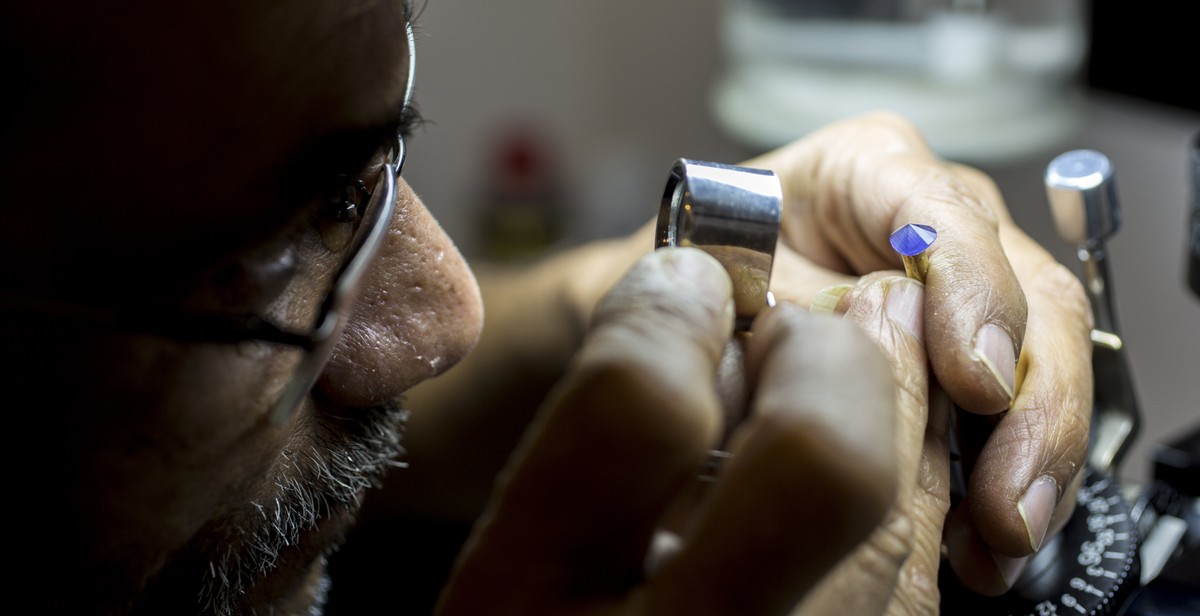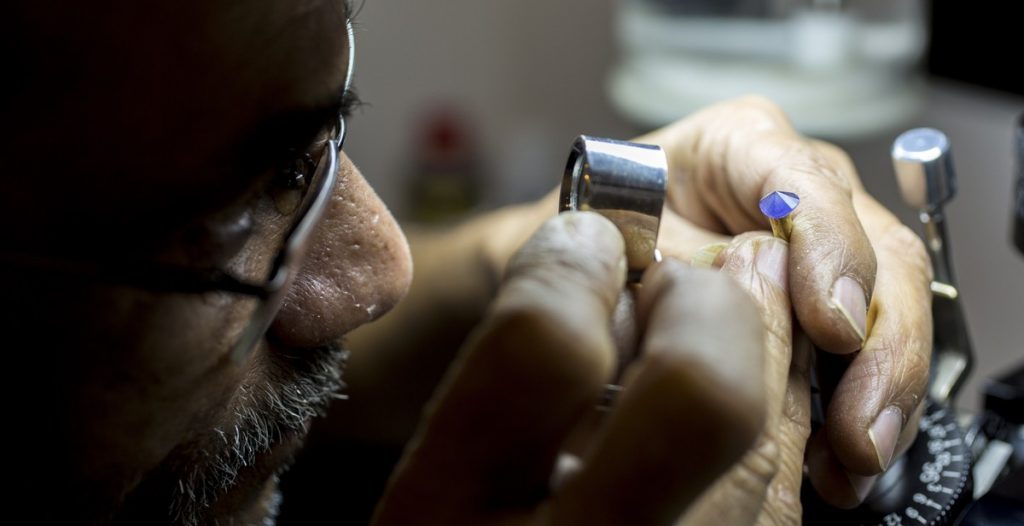What is a ‘gemologist’ and what is their role in the jewellery industry?
The jewellery industry is one that is steeped in tradition and history. From the ancient Egyptians to the modern-day fashionistas, jewellery has always been an important part of human culture. However, behind every beautiful piece of jewellery lies a complex and technical process that is overseen by a highly skilled professional known as a gemologist.
A gemologist is an expert in the field of gemstones and jewellery. They are trained to identify, grade, and evaluate gemstones, as well as to design and create jewellery. Gemologists play a crucial role in the jewellery industry, helping to ensure that the gems used in jewellery are of high quality and that the finished product meets the expectations of the customer.
The Role of a Gemologist
One of the primary roles of a gemologist is to evaluate the quality and authenticity of gemstones. They use a variety of tools and techniques to examine the stones, including microscopes, refractometers, and spectrometers. Gemologists also use their knowledge of gemstones to help design and create jewellery that showcases the stones in the best possible way.
Another important role of a gemologist is to educate consumers about gemstones and jewellery. They can provide valuable information about the characteristics of different types of gemstones, as well as advice on how to care for and maintain jewellery.
- Identify, grade, and evaluate gemstones
- Design and create jewellery
- Educate consumers about gemstones and jewellery
- Ensure the quality and authenticity of gemstones
Overall, gemologists are highly skilled professionals who play a vital role in the jewellery industry. Their expertise and knowledge help to ensure that the gems used in jewellery are of the highest quality, and that the finished product meets the expectations of the customer.

What is a Gemologist?
A gemologist is a trained professional who specializes in identifying, grading, and appraising gemstones. They are experts in the field of gemology, which is the scientific study of gemstones. Gemologists are highly skilled in evaluating the quality, value, and authenticity of precious stones and minerals, and they play a crucial role in the jewelry industry.
Role of a Gemologist in the Jewelry Industry
Gemologists are an integral part of the jewelry industry. They provide valuable insights and knowledge that help ensure the quality and authenticity of the gemstones used in jewelry. Gemologists work closely with jewelers, designers, and manufacturers to select the best gemstones for their products, and they also verify the authenticity of gemstones that have already been purchased.
Gemologists use a variety of tools and techniques to evaluate gemstones. They may use a microscope to examine the internal structure of a gemstone, or they may use a spectroscope to analyze its color and chemical composition. They may also use a refractometer to measure a gemstone’s refractive index, which can help determine its authenticity.
Education and Training
To become a gemologist, individuals must undergo extensive education and training. Most gemologists have a degree in gemology, geology, or a related field, and they also have practical experience working with gemstones. Many gemologists also hold professional certifications, such as the Gemological Institute of America’s Graduate Gemologist (GG) certification.
Gemologists must stay up-to-date with the latest developments in the field of gemology. They attend conferences, workshops, and seminars to learn about new techniques and technologies that can help them evaluate gemstones more accurately.
Conclusion
Gemologists play a critical role in the jewelry industry. They are experts in the field of gemology and are trained to evaluate the quality, value, and authenticity of gemstones. Their expertise helps ensure that consumers are getting the best possible products, and they are an essential part of the jewelry-making process.

Gemologist’s Role in the Jewellery Industry
A gemologist is a professional who is trained in the identification, evaluation, and appraisal of gemstones. Their role is crucial in the jewellery industry as they play a significant part in ensuring the quality of the gems used in jewellery making. Gemologists have a combination of scientific and artistic skills that make them highly sought after in the industry.
Identification and Evaluation
The primary role of a gemologist is to identify and evaluate gemstones. The gemologist uses a variety of tools and techniques to determine the authenticity, quality, and value of the gemstones. They use a microscope, a refractometer, and a spectroscope to examine the gemstones and determine their chemical and physical properties. They also use their expertise to identify the origin of the gemstone and any treatments it may have undergone.
Certification and Appraisal
Gemologists also provide certification and appraisal services. They issue certificates that provide information about the gemstone, including its authenticity, quality, and value. These certificates are important for buyers and sellers as they provide a guarantee of the gemstone’s quality and value. Gemologists also appraise gemstones for insurance purposes or to determine their resale value.
Quality Control
Gemologists play a critical role in ensuring the quality of gemstones used in the jewellery industry. They inspect the gems to ensure they meet the industry’s standards for clarity, color, and cut. They also ensure that the gemstones are ethically sourced and that they have not been treated or enhanced in any way that could compromise their quality or value.
Education and Research
Gemologists are also involved in education and research. They teach courses on gemology and provide training to aspiring gemologists. They also conduct research on gemstones to improve their understanding of their properties and origins. This research helps to advance the industry and improve the quality of gemstones used in jewellery making.
- Overall, the role of a gemologist in the jewellery industry is crucial for maintaining the quality and authenticity of gemstones used in jewellery making.

Gemologist’s Training and Certification
A gemologist is a professional who specializes in the study of precious stones and gems. Gemologists are trained to identify, grade and appraise gems and gemstones. They also have knowledge of the different properties of gems and how they can be used in jewelry making. Gemologists play an important role in the jewelry industry as they help ensure that the gems used in jewelry are of high quality and value.
Education and Training
Gemologists typically have a background in geology, mineralogy, or a related field. A bachelor’s degree in one of these fields is often required to become a gemologist. Some gemologists also have a degree in jewelry design or a related field. In addition to formal education, gemologists receive on-the-job training and may also attend workshops and seminars to keep up with new developments in the industry.
Certification
Many gemologists choose to pursue certification from a professional organization such as the Gemological Institute of America (GIA). The GIA offers a variety of certification programs for gemologists, including the Graduate Gemologist program, which is considered the most prestigious certification in the industry. To become a Graduate Gemologist, candidates must complete an intensive course of study that covers gemology theory, gemstone grading, and identification techniques. The program also includes hands-on training and requires candidates to pass a series of exams.
Accreditation
In addition to certification, many gemologists also seek accreditation from professional organizations such as the American Gem Society (AGS). Accreditation from the AGS is based on a rigorous set of standards that cover ethical business practices, gemstone grading, and customer service. To become accredited, gemologists must meet these standards and pass a series of exams. Accreditation from the AGS is a mark of excellence in the industry and can help gemologists build their reputation and credibility.
- Overall, becoming a gemologist requires a combination of education, training, certification, and accreditation.
- Gemologists play a critical role in the jewelry industry by ensuring that gems are of high quality and value.
- Professional organizations such as the GIA and AGS offer certification and accreditation programs to help gemologists build their skills and reputation.

Conclusion
In summary, a gemologist is a highly trained and knowledgeable professional who specializes in the study of gemstones. They play a crucial role in the jewelry industry, providing expert advice and guidance on the quality, value, and authenticity of gemstones.
Gemologists are responsible for identifying, grading, and appraising gemstones, as well as providing advice on the best practices for buying and selling them. They work closely with jewelers, collectors, and other professionals in the industry to ensure that the highest standards of quality and authenticity are maintained.
If you are interested in pursuing a career as a gemologist, there are many educational and training programs available to help you develop the necessary skills and knowledge. Whether you are interested in working in the jewelry industry or simply have a passion for gemstones, becoming a gemologist can be a rewarding and fulfilling career choice.
- Gemologists are experts in the study of gemstones, providing advice and guidance on quality, value, and authenticity.
- They are responsible for identifying, grading, and appraising gemstones, and work closely with others in the industry to maintain high standards.
- Pursuing a career as a gemologist can be a rewarding and fulfilling choice, with many educational and training programs available.

